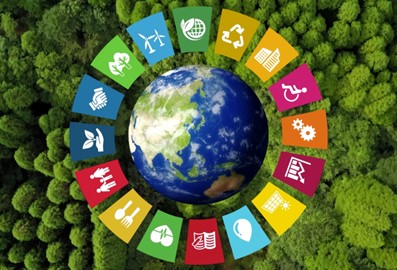
Climate Matters has focussed particularly on the dangers and causes of climate change. However, climate change is just one facet, albeit a massive one, of the overall degradation of the planet caused by unrestrained growth.
Sir David Attenborough said some years ago:
“We have a finite environment—the planet. Anyone who thinks that you can have infinite growth in a finite environment is either a madman or an economist.”
In 2015, on the occasion of its seventieth anniversary, the United Nations launched its Sustainable Development Goals in a document entitled “Transforming our world: the 2030 Agenda for Sustainable Development”. The plan consists of 17 Sustainable Development goals and 169 targets. The plan recognises, among other goals, the need to:
“protect the planet from degradation, including through sustainable consumption and production, sustainably managing its natural resources and taking urgent action on climate change, so that it can support the needs of the present and future generations.”
Sustainability is an absolute necessity for the health of the planet. Unsustainable exploitation of resources has led to the destruction of natural environments, loss of biodiversity, pollution and greenhouse gas emission. These directly affect the ability of the planet to provide an adequate environment for sustaining life.
The following are the Sustainable Development Goals agreed by all nations and delegates at the 2015 conference.
Sustainable Development Goals
Goal 1. End poverty in all its forms everywhere
Goal 2. End hunger, achieve food security and improved nutrition and promote sustainable agriculture
Goal 3. Ensure healthy lives and promote well-being for all at all ages
Goal 4. Ensure inclusive and equitable quality education and promote lifelong learning opportunities for all
Goal 5. Achieve gender equality and empower all women and girls
Goal 6. Ensure availability and sustainable management of water and sanitation for all
Goal 7. Ensure access to affordable, reliable, sustainable and modern energy for all
Goal 8. Promote sustained, inclusive and sustainable economic growth, full and productive employment and decent work for all
Goal 9. Build resilient infrastructure, promote inclusive and sustainable industrialization and foster innovation
Goal 10. Reduce inequality within and among countries
Goal 11. Make cities and human settlements inclusive, safe, resilient and sustainable
Goal 12. Ensure sustainable consumption and production patterns
Goal 13. Take urgent action to combat climate change and its impacts*
Goal 14. Conserve and sustainably use the oceans, seas and marine resources for sustainable development
Goal 15. Protect, restore and promote sustainable use of terrestrial ecosystems, sustainably manage forests, combat desertification, and halt and reverse land degradation and halt biodiversity loss
Goal 16. Promote peaceful and inclusive societies for sustainable development, provide access to justice for all and build effective, accountable and inclusive institutions at all levels
Goal 17. Strengthen the means of implementation and revitalize the Global Partnership for Sustainable Development
* Acknowledging that the United Nations Framework Convention on Climate Change is the primary international, intergovernmental forum for negotiating the global response to climate change.
These goals are laudable, indeed essential, but the difficulties involved in approaching them should not be understated. Two paragraphs from the report illustrate this clearly:
“Sustainable development recognizes that eradicating poverty in all its forms and dimensions, combating inequality within and among countries, preserving the planet, creating sustained, inclusive and sustainable economic growth and fostering social inclusion are linked to each other and are interdependent.”
And
“Realizing gender equality and the empowerment of women and girls will make a crucial contribution to progress across all the Goals and targets. The achievement of full human potential and of sustainable development is not possible if one half of humanity continues to be denied its full human rights and opportunities.”
Despite the good intentions and bold words, the countries of the world have not excelled themselves in delivering any of these goals. For example, the US and UK are complicit in the oppression of women today in Afghanistan (in no other country are women and girls so oppressed on the basis of their sex). Their abrupt withdrawal from Afghanistan in 2021 triggered the collapse of the Afghan government under which the situation for women and girls was improving. Since then, the Taliban has withdrawn even the most basic human rights of women and girls. In June this year, the UN held a conference on Afghanistan and, shamefully, acceded to the Taliban’s demands that Afghan women be excluded.
We are now 11 years into this 15-year program. I leave it to the reader to contemplate how much closer, or not, we are to these goals and how likely we are to achieve them.
Phil Shotton,
Ramsgate Society Lead on Environment and Climate Change